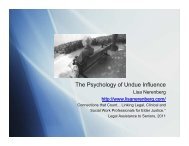Undue Influence: Definitions and Applications - California Courts ...
Undue Influence: Definitions and Applications - California Courts ...
Undue Influence: Definitions and Applications - California Courts ...
Create successful ePaper yourself
Turn your PDF publications into a flip-book with our unique Google optimized e-Paper software.
• Liking. People are more likely to comply with people they like. Enhancing influencers’<br />
likeability can therefore, increase their effectiveness. Research shows that physical<br />
attractiveness has a “halo” effect that leads people to believe that attractive people are also<br />
talented, kind, <strong>and</strong> intelligent. People also tend to like people they perceive as similar to<br />
themselves <strong>and</strong> who praise <strong>and</strong> compliment them. Repeated contact <strong>and</strong> positive associations<br />
(the person is associated with favorable people, places, or activities) also contribute to<br />
likeability.<br />
• Authority. Socialization instills in people the belief that obedience is “correct” <strong>and</strong> that<br />
people who have achieved authority have done so because they are knowledgeable, wise, <strong>and</strong><br />
powerful. Compliance can therefore by achieved when requests are made by figures of<br />
authority. Authority can be demonstrated symbolically by symbols like titles, dress, <strong>and</strong><br />
possessions.<br />
• Scarcity. People assign greater value to opportunities <strong>and</strong> objects that are less available. This<br />
belief is exploited when salespersons claim that there are only a limited number of products<br />
available or there is a deadline for purchases. The scarcity principle further applies to the way<br />
that information is evaluated. Research indicates that the act of limiting access to a message<br />
may cause individuals to want it more <strong>and</strong> to perceive it as more persuasive.<br />
Personal Fraud<br />
Fraud refers to crimes that involve issues of trustworthiness <strong>and</strong> honesty. The term<br />
“personal fraud victims” distinguishes individual victims from governments, corporations, or<br />
other institutions that are also likely to suffer losses from fraud. The types of fraud that<br />
individuals commonly fall victim to include scams, telemarketing, fraudulent financial advice, or<br />
fraudulently gaining access to victims’ property or assets.<br />
Jonathan J. Rusch (1998, 1999), a litigator with the U.S. Department of Justice <strong>and</strong> an<br />
expert in telemarketing, cites social influence theories <strong>and</strong> motivation research to explain the<br />
“sustained psychological warfare” used in telemarketing fraud. Drawing from Cialdini’s<br />
principles of social influence, Rusch describes how those experienced at deceiving others<br />
gradually gain the compliance of people who have little experience or skill in recognizing <strong>and</strong><br />
85




